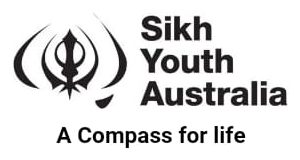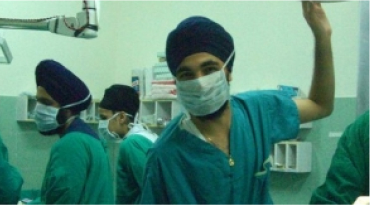“>Posted on 20/11/10 by Saranpaal Calais | Category: Youth Stories
The Daman Diaries: The Journey Begins
Setting the Scene
Attending the Medical camp and seeing such charitable service was definitely a rememberable experience. The first day started off with ardas and a saropas were bestowed around the necks of all volunteering doctors, nurses, physiotherapists, nurses, engineers, and even us students! The Majority of the travelling team was from Punjab this time and there were physicians from a wide range of specialties offering free clinics at the Akal Charitable Hospital.
The sheer number of patients waiting for a consultation was quite surprising. The patients had travelled from as far as 300 km to make it to the medical camps. Many of the patients live in houses that they have just erected where ever they found a piece of flat land along the mountain, and for this reason transportation always required at least 5-10 km of travel by foot.
The first day, we started off in the Ophthalmology clinic and we just sat and watched many quick consultations with a very well respected ophthalmic surgeon from Chandigarh. There was also an optometrist who was conducting eye testing and examinations. The clinic was extremely busy. Many patients have no access to optometrists or ophthalmologists and so they come to the clinic for eye sight testing. Some are amazed at the improvements that a new lens in their glasses makes. A few patients were identified to have cataracts and glaucoma that will require surgery in the future, their details are recorded and they are called up when there is a visiting ophthalmic surgeon. These surgeries in a private setting can cost up to $1,000 – $2,000 normally in India, however they are done for free during the medical camps.
The Surgeries
After spending three hours at the ophthalmic clinic, we went up to the Operating Theatres. There was a team of at least 20+ surgeons and anaesthetists from all over India, and one from the USA. They were spread across 4 operating theatres which had surprisingly advanced equipment for a rural facility. They also had a large stock of essential medications. All care is taken to provide the best possible service to the patients and safety precautions for infection control are still gospel. It was great to see that patient care was the number one priority of all the staff and volunteers even if they had to be resourceful due to the limited supply of equipment.
Why these camps are helpful…
The medical system in India is very different to that of Australia. In India medical care in private hospitals is free but they are not easily accessible and the private sector is very expensive. The travel expenses, cost of accommodation and the exhaustion of making multiple trips to a major city make access to surgical treatment extremely difficult for the patients. Many choose not to have the surgery, because the travel expenses are a significant burden in themselves.
This is where the Kalgidhar Society is able to serve the local community. They advertise the medical camps extensively throughout Himachal Pradesh and even in Punjab. They have flyers posted to hospitals and medical practitioners as well as mass SMSs sent to the public informing them of the free services available and the dates. The patients can be assessed and operated on all over the course of 2 days, which makes the surgery far less exhaustive. The patients and their family are also provided free housing and langar.
It truly is an amazing initiative and I hope I have shed some light on why it is so important for the community. (Please contact me for information; I would love to share more about it with you all)
There were over 80 surgeries conducted over the 2 days and the surgeons worked tirelessly till 1am. This is a huge number even though this time the camps were unadvertised because the dates were confirmed a little late. The surgeons were from many states and of differing religions, with the key aim to offer help to those that need it. This is what sewa is all about. Though I wish I was able to play a greater role and actually assist with surgeries I was grateful just to experience the atmosphere where everyone works together as a team for the benefit of others. Sewa defies the theories of the “zero sum game” because here everyone benefits- some gain from the services offered and some gain from the rewarding feeling of playing a part in the betterment of the community and mankind. The overall feel during the medical camps definitely had a positive feel to it. Baba Iqbal, the president of the Kalgidhar society has stated numerous times that there are spiritual vibrations that permeate through the Valley of Devine Peace that is Baru Sahib.
More to come soon!
– Daman Bhatia


